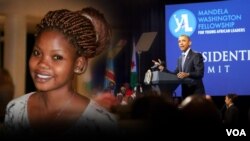While sign language is now recognized as one of Zimbabwe’s 16 official languages, people with hearing impairments remain some of the most marginalized.
And now one activist, Sithabiso Ndlovu, an advocate for the deaf community is urging drastic action.
She wants the government to make it compulsory for its essential services workers such as law enforcement agents and healthcare personnel to learn sign language so they can communicate effectively with the deaf.
“It’s something that can be easily implemented to say before someone graduates from the police force, they should know basic sign language,” Ndlovu says.
“This so they can know how to communicate when they arrest a deaf person or come across someone who needs help; nurses too, how do you deal with a patient when they cannot understand their language?”
Ndlovu is one of the 60 promising young Zimbabweans headed for the United States next month to study leadership at various institutions of learning under the coveted Mandela Washington Fellowship.
While not deaf herself, she is excited there is at least one fellow with a hearing disability in her group; Agness Chindimba, with whom she will be stationed at the University of Delaware.
After noticing the communication barrier between people with hearing impairments and the general public, Ndlovu took it upon herself to bridge the gap.
She launched a YouTube channel where she posts video lectures explaining sign language. In one clip Ndlovu walks through the alphabet.
She does much of her advocacy through her AfriAct Foundation, which works with underprivileged and disabled youths. But Ndlovu wants complementary efforts from both government and the general public.
“The government is trying but not much has been done in terms of pushing sign language as much as we push English; as much as we push Ndebele and Shona,” she says.








